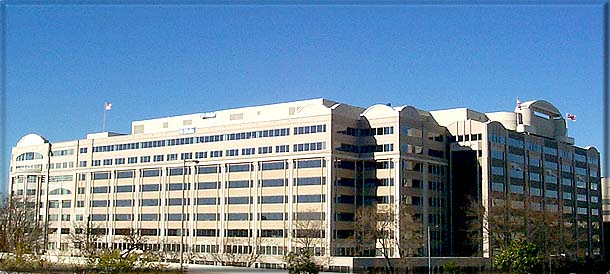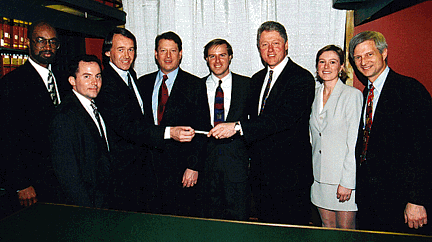America’s broadband blueprint could wither on the vine of good intentions if some of America’s largest telecommunications companies prevail in efforts to derail the parts they dislike. This morning, Reuters reports Julius Genachowski, the chairman of the Federal Communications Commission, and his circle of advisers are weighing options to try and keep the Obama Administration’s broadband policies on track.
They have their work cut out for them.
Net Neutrality vs. Restraint of Trade
In January, the Federal District Court of Appeals for the District of Columbia gave a hostile reception to the Commission’s argument it had the authority to order Comcast to stop throttling the speeds of their broadband customers. Although Comcast complied, they also filed suit claiming the FCC overstepped its boundaries when it interfered with the company’s business practices.
A favorable court ruling for Comcast could create major problems for the Obama Administration’s Net Neutrality plans and broadband industry oversight in general.
Those monitoring the DC Circuit suspect the court will find for Comcast, but to what degree is unknown. A narrow ruling could simply find the FCC erred in how it censured Comcast. A broader ruling could require the Commission to seek more explicit authority from Congress to oversee broadband. A sweeping ruling could wipe away the Commission’s ability to involve itself in broadband oversight, period.
Plan B: Regulate Broadband Under Existing Telephone Rules
 One way around a court ruling unfavorable to Commission oversight powers would be to regulate broadband services under the existing rules governing phone service. The most controversial aspect of those rules are found in “common carrier” provisions — including those that could potentially force open the broadband networks offered by cable and telephone companies to third party competitors.
One way around a court ruling unfavorable to Commission oversight powers would be to regulate broadband services under the existing rules governing phone service. The most controversial aspect of those rules are found in “common carrier” provisions — including those that could potentially force open the broadband networks offered by cable and telephone companies to third party competitors.
While telephone companies have grudgingly accepted their more regulated status under the Commission’s regulatory service model, broadening it to also cover broadband will start World War III, according to Susan Crawford, former special assistant to President Barack Obama for science, technology, and innovation policy.
With billions in profits at stake, large telecommunications companies from AT&T and Verizon on the telephone side to Comcast and Time Warner Cable on the cable side would likely file lawsuits demanding such regulatory policies be deemed unconstitutional or also exceed Commission authority.
One warning sign that Obama’s FCC is not the same as the one in place under President Bush arrived in last week’s approval of a merger between Skyterra, a satellite company planning a nationwide 4G mobile network, and private capital equity firm Harbinger. The FCC included provisions in the approval permitting the agency to review any plans by SkyTerra to lease or provide wholesale access of its spectrum to AT&T Mobility or Verizon Wireless. In effect, the Commission can veto moves by the two mega-carriers to become even larger through SkyTerra.
AT&T and Verizon Wireless called the FCC’s approval terms “flawed” and “manifestly unwise and potentially unlawful.”
Congressional Action: Reopening the Telecommunications Act of 1996
Another possible option for the FCC is to seek expanded authority with the passage of new telecommunications laws enacted in Congress. The last wholesale review of telecom policy was during the second term of the Clinton Administration. The 1996 Telecommunications Act was a gift to the industry, delivering sweeping deregulation, allowing increased consolidation and reduced oversight.
Opening the door to a 2010 Telecom Act would bring millions of dollars in lobbying by large players to preserve, protect, or expand their positions in the marketplace. Many providers still favor telecommunications reform that would further deregulate their businesses.
Amit Schejter, professor of telecommunications policy at Penn State University, told Reuters he doesn’t believe Congress can pass such legislation at this time, especially with a divided, partisan Congress.
Not everyone is concerned that the FCC’s position between a rock and a hard place is all that unusual. The last administration’s FCC rarely tangled with the telecommunications industry. That Chairman Genachowski may be leading the Commission in a different direction is welcome news for some.
“The only reason this looks new and shocking is that for so long the FCC hasn’t made a decision opposed by a major company,” Ben Scott, policy director for Free Press told the Washington Post. “The FCC has spars with companies on a regular basis and this is good news.”


 Subscribe
Subscribe


Congressional Conservatives agree with Net Neutrality……when only given the definition. Rep. Mike Rogers (R-MI) chastised Genechowski in a House subcommittee hearing, and asked him how on Earth the FCC had the authority to “regulate the Internet.” See, Mr. Rogers is confused about Net Neutrality. He thinks it’s all about the FCC regulating content on the Net and picking winners and losers, which is precisely what Net Neutrality prevents ISPs AND government from doing. At 2:47:00 a confused Rep. Rogers agrees with Net Neutrality when presented it’s definition by Genechowski… http://c-span.org/Watch/Media/2010/03/25/HP/A/31062/House+Oversight+Subcmte+Hearing+on+the+FCCs+National+Broadband+Plan.aspx The biggest threat to Net Neutrality is allowing continued mis-information… Read more »